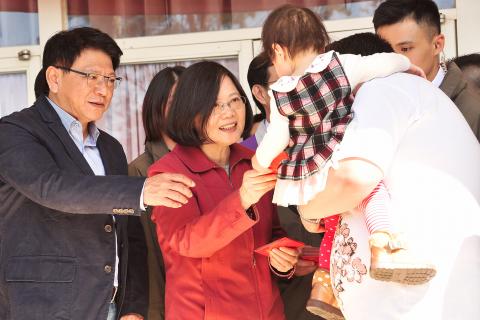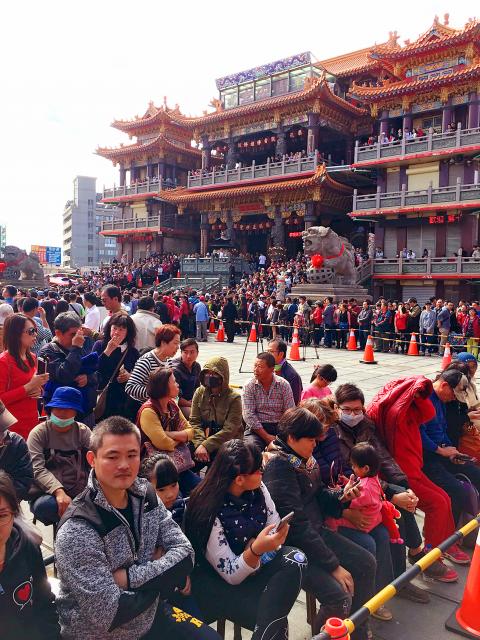Lunar New Year messages from President Tsai Ing-wen (蔡英文) on Twitter yesterday sparked a war of words between Taiwanese and Chinese netizens.
“From the people of Taiwan, we wish everyone a bright and prosperous Year of the Rooster,” Tsai wrote in separate messages in English and Japanese to Internet and social media users.
Her messages drew a torrent of criticism from Chinese netizens, with some leaving vitriolic comments that accused Tsai of pandering to Japan and the US by favoring Japanese and English over Chinese.

Photo: Tsai Tsung-hsien, Taipei Times
Saying that the Japanese do not celebrate the Lunar New Year, a number of the Chinese critics accused Tsai of “selling out to Japan,” while others referenced the oppression perpetrated by the Japanese government during the Japanese colonial era in Taiwan.
Tsai should have tweeted in Mandarin instead, as Chinese characters belong to China, several Chinese said.
However, Taiwanese were quick to argue the claim, with one saying that Hong Kong, Singapore and Malaysia all use Chinese characters.

Photo: CNA
Chinese netizens should “stay out of other people’s business,” another said.
One Taiwanese netizen said that Tsai and Taipei Mayor Ko Wen-je (柯文哲) tweet in English as a means of diplomacy, while another said that most Taiwanese tend to use other social networking platforms more than Twitter.
The Presidential Office said Tsai’s tweet shows the president has a cosmopolitan world view, adding that it was meant to wish all Twitter users a happy Lunar New Year.
People should be magnanimous over the holiday, the office said.
Tsai spent the first day of the Year of the Rooster visiting temples around the nation to ask for blessings from the gods and distributing hongbao (紅包), or red envelopes, each with a NT$1 coin inside, to crowds of people hoping to receive an envelope from her personally.
The tradition of the president distributing hongbao on the first day of the new lunar year was begun by former president Lee Teng-hui (李登輝) in his hometown.
Tsai’s first stop was the Jue Siou Temple (覺修宮) in Taipei, where she made an offering of incense and prayed for the blessings of the temple god. She then proceeded to visit Fu-an Temple in Pingtung County’s Checheng Township (車城), where she handed out red envelopes to the throngs of people who had waited in long lines.
Many in the crowd shouted: “Welcome home, president.”
Tsai also visited Fenggang Village (楓港) in the county’s Fangshan Township (枋山), where her ancestral home is located and where she was warmly received by residents.
“We are glad that President Tsai has not forgotten about the support people in her hometown have shown her,” one resident said.
Tsai also visited temples in Tainan, Chiayi and Kaohsiung.
The outside of Tsai’s envelope featured a rooster along with wishes for a happy new year in Chinese and English and the signatures of Tsai and Vice President Chen Chien-jen (陳建仁).
Additional reporting by Tsai Tsung-hsien and CNA

AIR SUPPORT: The Ministry of National Defense thanked the US for the delivery, adding that it was an indicator of the White House’s commitment to the Taiwan Relations Act Deputy Minister of National Defense Po Horng-huei (柏鴻輝) and Representative to the US Alexander Yui on Friday attended a delivery ceremony for the first of Taiwan’s long-awaited 66 F-16C/D Block 70 jets at a Lockheed Martin Corp factory in Greenville, South Carolina. “We are so proud to be the global home of the F-16 and to support Taiwan’s air defense capabilities,” US Representative William Timmons wrote on X, alongside a photograph of Taiwanese and US officials at the event. The F-16C/D Block 70 jets Taiwan ordered have the same capabilities as aircraft that had been upgraded to F-16Vs. The batch of Lockheed Martin

GRIDLOCK: The National Fire Agency’s Special Search and Rescue team is on standby to travel to the countries to help out with the rescue effort A powerful earthquake rocked Myanmar and neighboring Thailand yesterday, killing at least three people in Bangkok and burying dozens when a high-rise building under construction collapsed. Footage shared on social media from Myanmar’s second-largest city showed widespread destruction, raising fears that many were trapped under the rubble or killed. The magnitude 7.7 earthquake, with an epicenter near Mandalay in Myanmar, struck at midday and was followed by a strong magnitude 6.4 aftershock. The extent of death, injury and destruction — especially in Myanmar, which is embroiled in a civil war and where information is tightly controlled at the best of times —

China's military today said it began joint army, navy and rocket force exercises around Taiwan to "serve as a stern warning and powerful deterrent against Taiwanese independence," calling President William Lai (賴清德) a "parasite." The exercises come after Lai called Beijing a "foreign hostile force" last month. More than 10 Chinese military ships approached close to Taiwan's 24 nautical mile (44.4km) contiguous zone this morning and Taiwan sent its own warships to respond, two senior Taiwanese officials said. Taiwan has not yet detected any live fire by the Chinese military so far, one of the officials said. The drills took place after US Secretary

THUGGISH BEHAVIOR: Encouraging people to report independence supporters is another intimidation tactic that threatens cross-strait peace, the state department said China setting up an online system for reporting “Taiwanese independence” advocates is an “irresponsible and reprehensible” act, a US government spokesperson said on Friday. “China’s call for private individuals to report on alleged ‘persecution or suppression’ by supposed ‘Taiwan independence henchmen and accomplices’ is irresponsible and reprehensible,” an unnamed US Department of State spokesperson told the Central News Agency in an e-mail. The move is part of Beijing’s “intimidation campaign” against Taiwan and its supporters, and is “threatening free speech around the world, destabilizing the Indo-Pacific region, and deliberately eroding the cross-strait status quo,” the spokesperson said. The Chinese Communist Party’s “threats